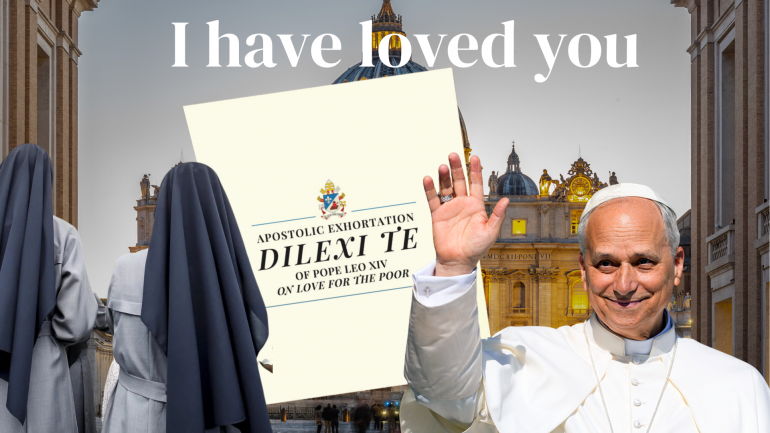Dilexi Te Challenges Consecrated Men and Women to Love in Action

Pope Leo’s first Apostolic Exhortation, Dilexi Te (“I have loved you”), issued on October 9, calls all Christians to live a love that is both contemplative and active.
At its heart is the inseparable link between love for God and love for the poor, including those facing material, social, and spiritual poverty. Highlighting the “double poverty” of women, the Pope challenges indifference and urges practical, transformative action: feeding the hungry, welcoming migrants, educating the marginalized, and standing with the excluded.
Drawing on Scripture, saints, and the Church’s social teaching from Rerum Novarum to Fratelli Tutti, Dilexi Te emphasizes that faith without justice and love without action are incomplete. It calls believers to recognize the poor not as problems to solve, but as members of God’s family, making mercy, solidarity, and justice the living expression of God’s love in the world.
Implications for Religious
With the “World Day of the Poor” approaching on November 16, Dilexi Te inspires consecrated men and women to examine their lives: Are we merely speaking of love, or truly living it through acts of mercy, solidarity, and transformative service?
No congregation was founded for the well-off, nor with a bank balance. The founders were God-experienced persons who heard the cry of God through the cry of the poor. Just as Yahweh heard the cry of the Israelites and came down to liberate them from slavery, the founders were moved by the realities of their times and responded to the crisis with creativity and courage. Our predecessors started institutions intending to continue their founders' original charism and mission.
As consecrated religious, we are invited to learn several crucial lessons from Dilexi Te:
Simplicity and Prophetic Witness
Consecrated life is, by its very nature, prophetic. It calls us to live visibly among the poor in solidarity, resisting materialism, consumerism, and ‘me-ism.’ When large sums are spent on dinners, decorations, or flower arrangements without tangible impact, shouldn’t we review some of our jubilees and solemn celebrations? Is our worship divorced from life? The poor cry out to us today. As religious, do we have the prophetic courage to respond proactively and accompany them in their struggle for a more just, humane, and hope-filled world?
Recognizing Christ
We are called to see the suffering Christ in the wounded faces of the poor, making our service to them not merely humanitarian, but a fundamental encounter with Jesus Himself.
Integrating Faith and Works
“Faith by itself, if it has no works, is dead” (James 2:17). Our prayer life must be integrated with concrete action through our ministries. Pope Leo echoes Pope Francis: “A prayer that does not lead to practical action for your brother or sister, the poor, a person in difficulty, is sterile and incomplete.” If the poor do not move our hearts, our prayers remain hollow.
Empowering the Marginalized
Our mission is to uplift the weaker and underprivileged through integral development, not only through academic education, but also through innovative and creative means. Instead of strengthening only our institutions and building walls, we must empower others. Justice postponed is justice denied; the time to act is now.
The Poor as Our Evangelizers
We often think of serving the poor as a one-way act, but Pope Leo reminds us that they teach us patience, resilience, hope, and trust in God. They evangelize us through their experiences.
Oases of Hospitality
Religious communities are called to be oases of dignity and hospitality, where no one is excluded. Like a mother, we are called to welcome, protect, and integrate migrants, refugees, the sick, and the uneducated. We must place them at the center of our life and mission, ensuring that our charism translates into tangible gestures of love and justice. Even within our own campuses and institutions, are we including them in planning and listening to their suggestions?
Dilexi Te is not merely a document, it is a mandate for transformation. It provides an overview of what the Church has done, continues to do, and should do for the world’s poorest. It speaks forcefully to the Church at a time when many are excluded and marginalized.
It calls consecrated life to rediscover the radical Gospel path: to walk with the poor, listen to their stories, and allow their lives to evangelize us. As Paul says in Philippians 2:4–5, “Let each of you look not to your own interests, but to the interests of others. Let the same mind be in you that was in Christ Jesus.” Acts 4:34 exhorts, “There was not a needy person among them.” Unless we reduce our wants, how can we share with the needy?
“It is not a sin to be rich,” Pope Leo reminds us, “but woe to us if we do not share.” Dilexi Te leaves us with a stirring challenge, to let love become active, courageous, and transformative, so that every encounter with the poor becomes an encounter with Christ Himself. This is not optional but necessary. True prophetic service often invites criticism, yet we must courageously stand with the marginalized and act for justice.








